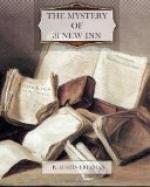“This is the letter,” exclaimed Mr. Winwood, dragging the document from his wallet and slapping it down on the table. “If you are acquainted with the case, sir, just read that, and let us hear what you think.”
I took up the letter and read aloud:
“JEFFREY BLACKMORE, DECD.
“DEAR MR. MARCHMONT,—
“I have gone into this case with great care and have now no doubt that the second will is a forgery. Criminal proceedings will, I think, be inevitable, but meanwhile it would be wise to enter a caveat.
“If you could look in at my chambers to-morrow evening we could talk the case over; and I should be glad if you could bring Mr. Stephen Blackmore; whose personal knowledge of the events and the parties concerned would be of great assistance in clearing up obscure details.
“I am,
“Yours sincerely,
“JOHN EVELYN THORNDYKE
“C.F. MARCHMONT, ESQ.”
“Well!” exclaimed Mr. Winwood, glaring ferociously at me, “what do you think of the learned counsel’s opinion?”
“I knew that Thorndyke was writing to you to this effect,” I replied, “but I must frankly confess that I can make nothing of it. Have you acted on his advice?”
“Certainly not!” shouted the irascible lawyer. “Do you suppose that we wish to make ourselves the laughing-stock of the courts? The thing is impossible—ridiculously impossible!”
“It can’t be that, you know,” I said, a little stiffly, for I was somewhat nettled by Mr. Winwood’s manner, “or Thorndyke would not have written this letter. The conclusion looks as impossible to me as it does to you; but I have complete confidence in Thorndyke. If he says that the will is a forgery, I have no doubt that it is a forgery.”
“But how the deuce can it be?” roared Winwood. “You know the circumstances under which the will was executed.”
“Yes; but so does Thorndyke. And he is not a man who overlooks important facts. It is useless to argue with me. I am in a complete fog about the case myself. You had better come in this evening and talk it over with him as he suggests.”
“It is very inconvenient,” grumbled Mr. Winwood. “We shall have to dine in town.”
“Yes,” said Marchmont, “but it is the only thing to be done. As Dr. Jervis says, we must take it that Thorndyke has something solid to base his opinion on. He doesn’t make elementary mistakes. And, of course, if what he says is correct, Mr. Stephen’s position is totally changed.”
“Bah!” exclaimed Winwood, “he has found a mare’s nest, I tell you. Still, I agree that the explanation should be worth hearing.”
“You mustn’t mind Winwood,” said Marchmont, in an apologetic undertone; “he’s a peppery old fellow with a rough tongue, but he doesn’t mean any harm.” Which statement Winwood assented to—or dissented from; for it was impossible to say which—by a prolonged growl.




